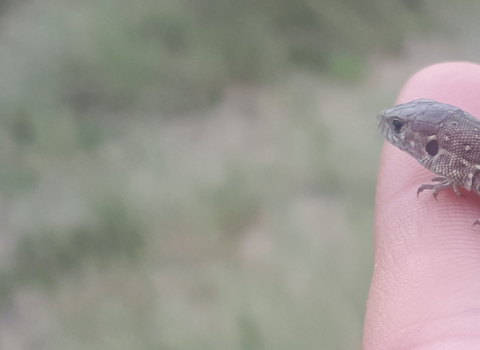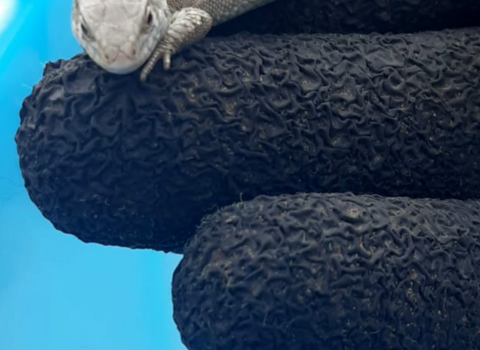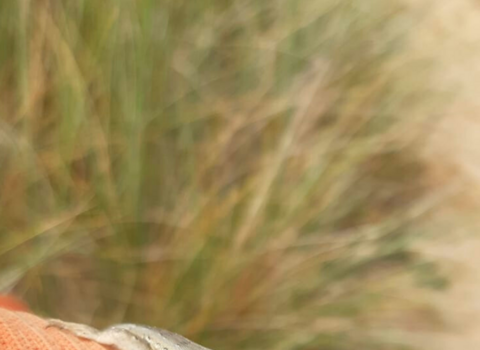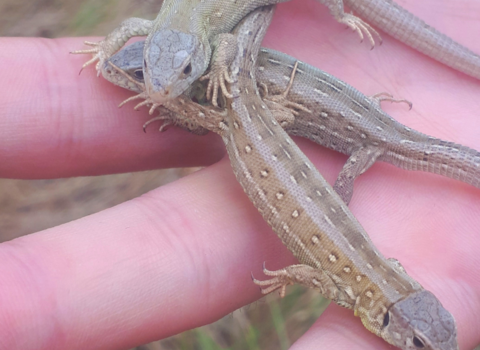For the last three years, the Fylde Sand Dunes Project have been working with the Fylde and North Merseyside Amphibian and Reptile Group to successfully reintroduce the rare sand lizard on to our dunes.
Reintroducing the UK's rarest lizard to the Fylde Sand Dunes
©Jeff Gorse
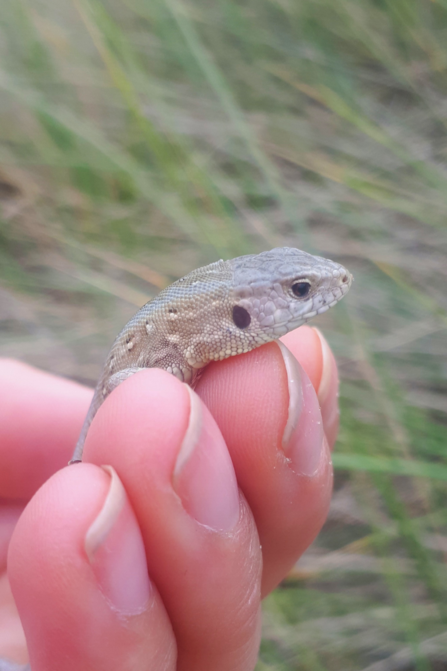
Sand Lizard before its re-introduction.
© Amy Pennington
The sand lizard has been extinct in the area since at least the 1960s. It is thought that this is a result of the urbanisation of the surrounding towns, leading to the fragmentation and destruction of the sand dunes. The degradation of the sand lizard's supporting habitat meant that the population of Fylde could no longer be supported on the dunes. This wasn't the only area to see a local extinction, the species has also been lost from north and west Wales, Cheshire, Kent, Sussex, Berkshire, Hampshire, Devon and Cornwall. Native populations now only remain in Merseyside, Surrey, and Dorset - though even here, losses of between 90 and 97% of the populations have occurred!
It is due to these losses, that the sand lizard is part of the Amphibian and Reptile Conservation’s (ARC) Biodiversity Action Plan. ARC are working with partner organisations like us to protect, manage and restore sites where the species occurs and to re-introduce sand lizards to managed sites in their historic range.
Over the last three years conservationists have been giving the UK’s rarest lizard a helping hand. Captive bred sand lizards have been released onto the Fylde Sand Dunes as part of a long-term conservation project to restore the species’ status and historic range within the UK.
The staff and volunteers on the Fylde Sand Dunes Project have been working hard to successfully restore our dune system for coastal defence. This has been achieved through practical conservation work to remove invasive species and allow the dunes to expand seaward by helping them to accrete. As a result the dune habitats, which are being managed and restored, are now the perfect home for sand lizards once more!
There has been a total of four lizard releases, one in 2018 and 2019, and two that I have had the pleasure of being involved with this year! A total of 300 sand lizards have now been released in different areas of the Fylde sand dunes.
During last week's release, the lizards were only one to three weeks old - and they became TV stars! Last Sunday, BBC North West tonight spent a whole morning filming the lizards as they were introduced to their natural habitat for the first time! As they were very relaxed animals, they had plenty of opportunities to pose for the camera. This very much pleased the cameraman, who dreams of filming with David Attenborough in the future!
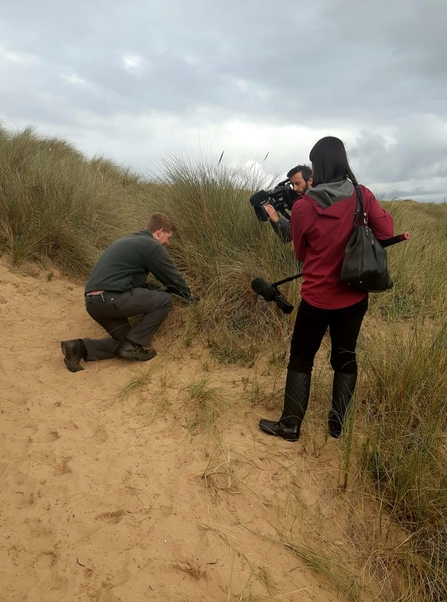
Andy Mills being filmed re introducing a Sand Lizard for BBC NW Tonight.
© Amy Pennington
The excitement of releasing these beautiful reptiles, quickly changed as soon as I got asked for an interview - eek! My mind blanked, I almost forgot everything I have ever known about our project!
Three of us were interviewed, with Ray Lynch (one of the breeders from the Fylde and North Merseyside Amphibian and Reptile Group) giving expert information on the lizards themselves, Andy (Fylde Council's Sand Dunes Ranger) explained how our dunes have become the perfect habitat for the re-introduction, and I talked about the benefits of our project to the local area.
I must not have been as exciting as Ray and Andy talking about the sand lizards, as my interview didn't quite make it to our 30 second segment on BBC NW Tonight...but the lizards did and it was a great experience nonetheless!
It didn’t end there though, the news travelled fast and soon BBC Breakfast were interested in the success story! Yes, the live, national BBC Breakfast programme!
So, a very early morning start for Andy, Ray and myself followed...except we got delayed by a closure on the M55 and unfortunately missed the first live interview! But it wasn't over there, we were able to take part in the second segment an hour later at 7.45 am. We trundled up through the dunes, unable to help carry any of the equipment due to Covid-19, trying to find the perfect spot to release a couple of sand lizards, in a place that would also allow the cameraman to get a signal.
Funnily enough, we weren’t meant to have any more lizards to release as Sunday had been our final chance before they hibernate at the end of September. But luckily enough for BBC Breakfast, when Ray got home on Sunday he had spotted two stragglers in the box, hiding in between tissue paper keeping themselves warm. This meant these two lizards were able to be released live on television, much to the excitement of Luxmy Gopal, the presenter that hosted the Breakfast interview! All went smoothly for the interviews and filming, with the sand lizard running into the vegetation of the dunes perfectly on cue.
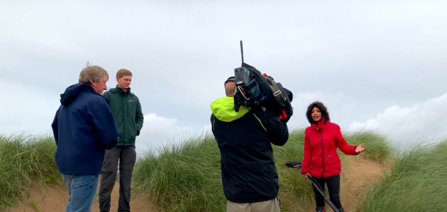
Socially distanced live filming for BBC Breakfast.
We already know that lizards from previous releases have been able to successfully breed in the dunes. This year, Ray and Paul spotted juveniles in the dunes that have not come from their captive bred populations. Hatched eggs have also been seen this year, these are really positive indicators of that the population is healthy and thriving - which is also a compliment to how well our sand dunes are managed for them as a habitat.
We will continue to monitor the success of the sand lizard population on the Fylde, looking for hatched eggs and other signs of new hatchlings as a result of successful breeding. Sand lizards are very solitary animals (clearly also keen on social distancing!) often only coming together for breeding, meaning that they will have already spread themselves far and wide across the dunes, finding their perfect home for the winter.
For more information contact:
- Fylde Council, geoff.willetts@fylde.gov.uk or andrew.mills@fylde.gov.uk
- Nick Moulton, Amphibian & Reptile Conservation, anju.sarpal@arc-trust.org or nick.moulton@arc-trust.org
- Ray Lynch, Fylde Amphibian and Reptile Group, ray.lynch@hotmail.co.uk


